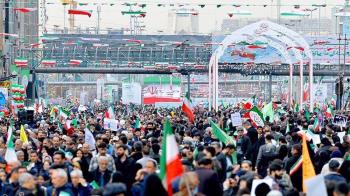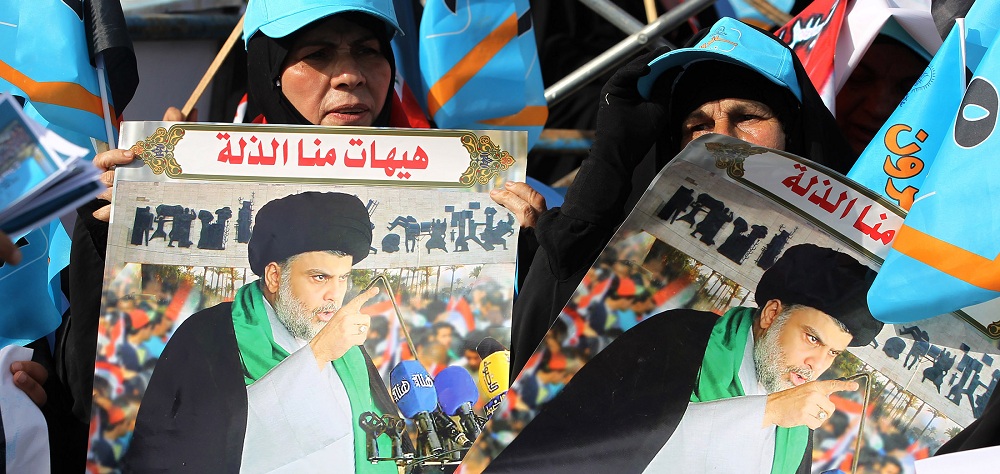Alwaght- Iraq's political stalemate has upgraded to the next level with the Sadrist Movement chief Muqtada al-Sadr bringing his supporters to the streets and opposing candidacy for prime minister post of Mohammed Shia al-Sudani, making dissolution of parliament and holding snap elections a sticking point between his supporters and his opponents.
In his August 3 speech, the powerful cleric gave a clear picture of the options he favors, including holding early elections, dissolving the parliament, and making fundamental reforms. He at the same time said that talks with the opponents is pointless.
Iraq has been in total political paralysis since the October 2021 general elections. The last early election's result gave no party an outright win, and the Sadrist Movement, as the victor, won only 73 seats out of 329. Since 2003 it has been customary that the dominant parties work out an agreement on a name for the PM post. They failed to do so this time even several months after the elections.
While the Sadrists wanted to form a 'national majority' government in coalition with the Sunnis and Kurds, the forces present in Shiite Coordination Framework (SCF) and their allies sought to maintain the long-used consensus formula for a coalition government. Unable to achieve the majority of the government he wanted, al-Sadr began to press his rivals, and after the resignation of his lawmakers on June 12 en masse, he has been insisting on dissolution of the parliament.
Terms for dissolution of the parliament
The choice of parliament dissolution faces some legal obstacles in addition to opposition by some political parties and their social support body.
According to Article 64 of the Iraqi Constitution, the dissolution of the parliament can be done in one of the following two ways: First, with the request of the president or the PM and the approval of the majority of parliamentarians. Second, with submission of a request by one-third of the members of the parliament and its approval by the majority of the lawmakers. However, in both cases, the approval of the parliament is needed. Additionally, the lawmakers cannot debate a dissolution due to ongoing sit-ins staged by al-Sadr supporters.
Holding elections also requires new legislation, because when the Federal Court rejected the SCF's complaint on vote counting results and upheld previous election results as legal, it required the parliament to pass new legislation on manual counting and sorting for future elections.
Therefore, even if everyone agrees to dissolve the parliament and go to elections, a transitional government must be formed before that for a year to rewrite the law and form a new election commission. Meanwhile, the country needs to approve its public budget and the allocation of at least 400 billion dinars for the voting process.
In this regard, Juma al-Ghalai, the spokesperson of the Independent Election Commission on Sunday, while denying the setting of the early election date, noted that the election spending usually has a special budget that may be approved within the federal budget or separately, and this requires a law.
This is making things difficult for al-Sadr, as SFC has tied green light to the early elections to going through the legal processes.
The Coordination Framework made it clear in a statement that it supports "any legal means to address political crises and achieve the interests of the people, including early elections after reaching a national consensus around them and creating a safe environment for their implementation and this requires sticking and respect to the constitutional institutions and not setting up obstacles in the way of their work."
Early elections and possible perpetuation of political limbo
The stress on new elections raises a question: Is there any guarantee that after new elections, the country will not fall in a new political uncertainty in terms of the results and their acceptance by the parties?
Agreement on early elections should be made with previous dialogue and guarantee that the political processes will be accepted by all parties. The conditions for the formation of a new government exist in case of no excesses by political factions and acceptance of the realities by political community. On the opposite side, insistence on the exclusive control of the cabinet in the future leaves no prospect for the possibility of ending the political deadlock.
The path to a new government in Iraq crosses the consensus among the Shiites, Sunnis, and Kurds and inter-party agreements. It is unlikely that in possible early elections Sadrist Movement performs better than the previous one and tendency to monopolization of power will again push other Shiite factions to seek a balance through unity afresh.
Definitely, restressing on fundamental reforms by al-Sadr or even hinting at moving towards changing the political system to presidential, after encouraging his supporters to attend the Green Zone in Baghdad and staging a sit-in in the parliament, come with the aim of reviving the relationship with 2019 protest movement, dubbed 'Tashreen forces', whose attraction by al-Sadr in last year election gave him the lead. But what complicates revival of relations with these forces is the remarks of their leaders about al-Sadr's stances and role against the protest movement more than once and his fluctuation of views in the past years.
Observers argue that it is hard to expect a united stance from Tashreen or other political forces belonging to 2019 protest movement, especially that these forces do not make a united front to unite their views in the political decisions.
On the opposite side, the factions present in the SCF have shown that they have a stable and powerful popular base, and the national, negotiation-based and responsible political discourse of this Shiite bloc guarantees maintaining and even enhancing its parliamentary weight in the upcoming elections.
All in all, not only the parliament dissolution and early elections pass through negotiations and formation of a new government, but also the prospects of new elections does not seem to address the demands of the pro-dissolution forces and can only compound the situation.



























